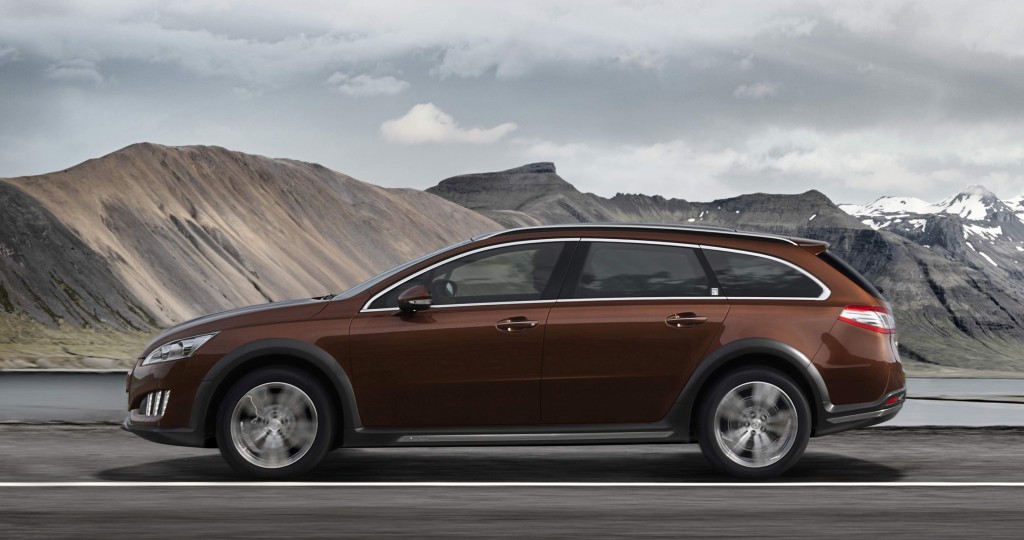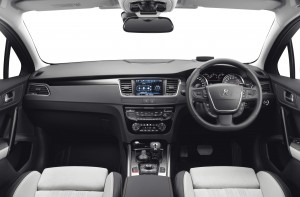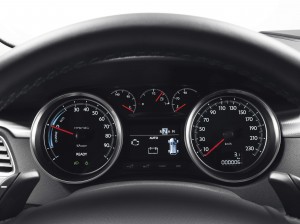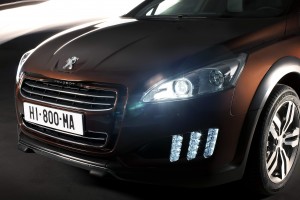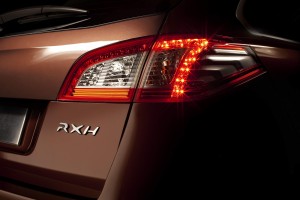Peugeot 508 RXH
PEUGEOT HASN’T always produced the best looking motors, but things have changed. The RCZ Sports Coupé and the 508 have really lifted the French car maker out of the dull design rut it had become stuck in.
The fetching 508 RXH, reviewed here, has a road presence that immediately sets it apart from many other mile-munchers. Refined, high and wide, the estate car is the top-of-the-range model of the 508 SW. It’s distinguished by LED daytime running lights that give an impression of having three vertical ‘lion claws’ on each side of its ‘floating’ grille. The RXH has other characteristics to make it special too. It has a unique bodykit; bespoke 18” Attila alloy wheels; a panoramic glass roof, and acoustic laminated side windows with rear privacy glass.
But what else is different about the RXH, I hear you ask? Well, it’s a four-wheel drive car that uses the latest hybrid technology. It combines Peugeot’s proven 2.0-litre HDi 163 diesel engine with a 37 bhp electric motor. The oil-burner powers the front wheels, while planet-saving green machinery drives the rear wheels.
Inside, the 508 makes for a comfortable environment – and so it should do, after all it’s bedecked with leather, idiot-proof gadgetry and electric seats. Hi-tech cabin features include a colour head up display unit so you can see driver information, such as your speed, projected on to the windscreen. Room is good too; the RXH will take four adults happily – maybe even five at a push – but the boot area, although square and easy to access, isn’t as big as the ordinary 508 SW’s. This is down to the hybrid system, which bites into the loading bay.
Behind the wheel, the ride is smooth and the steering is well-weighted. An uncomplicated electronically-controlled manual six-speed gearbox helps provide major savings in fuel consumption compared to a traditional ‘box. It also offers genuine driving satisfaction derived from the possibility of choosing the gear change mode at any time – manual or automatic – with either the gear lever or via controls behind the steering wheel.
Performance-wise, the RXH benefits from the collective force of its HDi diesel engine and the electric motor during acceleration, so it’s comparable to a much higher powered ‘normal’ car. The estate, with a combined 200 bhp at its disposal, can consequently pack a power-punch. It’ll do 0-62 in a good enough 9.5 seconds and will max out only when it gets to132 mph. On top of this, the 508 RXH releases CO2 emissions of just 107g/km and averages 68.9 mpg.
To manage all of the Peugeot’s talents, a dial on the centre console enables you to choose between four different operating functions: ‘Auto’, where the entire system is automatically controlled; ‘ZEV’ (Zero Emission Vehicle), which provides access to an all-electric mode; ‘Four-wheel drive’ (4WD), which tells both power trains to operate together as far as possible, and ‘Sport’ which favours faster gear changes at higher engine speeds. Transfer from the diesel engine to the electric motor happens automatically, due to a stop and start system which places the diesel in standby and restarts it if you depress the accelerator pedal or if there’s a low battery charge level.
Of course, being a potent, family-sized diesel/electric fusion vehicle, the RXH makes for an excellent commuting machine – and it’ll look the business in the company car park. Off the black stuff it won’t handle true mud-plugger territory, but it’ll cope with much more than an ordinary two wheel drive estate – and it’ll keep you safe and sound in wintry road conditions.
Another key advantage – if you go for this as a company car – is the very low 12 percent Benefit-in-Kind taxation. Also, the Peugeot attracts 100 percent Capital Write-down Allowance, meaning that there’s no further value to be carried over for taxation into the following year.
The 508 RXH certainly ticks many motoring boxes, and businesses will particularly value the considerable virtues that the Princely Pug has to offer. My only concern for private buyers is the price-tag. It’s a fantastically clever vehicle, but the best part of £34,000 is a lot to pay for a Peugeot. I wish quality eco-friendly cars were as friendly on the wallet – then we might all be tempted to part exchange our polluting jalopies.
PROS ‘N’ CONS
- Economy √
- Comfort √
- Looks √
- Kit √
- Expensive X
FAST FACTS
- Max speed: 132 mph
- 0-62 mph: 9.5 secs
- Combined mpg: 68.9
- Engine: 1997 cc 4 cylinder 16 valve turbo diesel + electric motor
- Max. power (bhp): 163 at 3850 rpm + (37 bhp elec motor)
- Max. torque (lb/ft): 221 at 2000 rpm (148 elec motor)
- CO2: 107 g/km
- Price: £33,695 on the road
Follow this link to watch a short promotional video
Now follow these links to read published reviews:
Country Gardening & Lifestyle, September / October 2012
SelectLocal Magazine for Ripley, October 2012
Fine City Magazine, October 2012
Strictly Business Magazine, September 2012
-
Categories
- Abarth
- Alfa Romeo
- Aston Martin
- Audi
- Bentley
- BMW
- Caterham
- Chevrolet
- Chrysler
- Citroen
- Dacia
- DS
- Ferrari
- Fiat
- Ford
- Great Wall
- Honda
- Hyundai
- Infiniti
- Isuzu
- Jaguar
- Jeep
- Kia
- Land Rover
- Lexus
- Lotus
- Maserati
- Mazda
- McLaren
- Mercedes
- MG
- Mini
- Miscellaneous Articles
- Mitsubishi
- Morgan
- Motability
- Nissan
- Peugeot
- Porsche
- Renault
- Rolls-Royce
- Saab
- Seat
- Skoda
- Subaru
- Suzuki
- Tesla
- Toyota
- Vauxhall
- Volvo
- VW
- Zenos
-
Articles
- April 2025
- February 2025
- January 2025
- September 2024
- July 2024
- March 2024
- January 2024
- December 2023
- September 2023
- August 2023
- May 2023
- January 2023
- October 2022
- July 2022
- May 2022
- April 2022
- February 2022
- December 2021
- November 2021
- October 2021
- September 2021
- August 2021
- July 2021
- June 2021
- May 2021
- April 2021
- March 2021
- February 2021
- January 2021
- December 2020
- November 2020
- October 2020
- September 2020
- August 2020
- July 2020
- June 2020
- May 2020
- April 2020
- March 2020
- February 2020
- October 2019
- September 2019
- August 2019
- July 2019
- June 2019
- April 2019
- March 2019
- February 2019
- January 2019
- October 2018
- August 2018
- July 2018
- June 2018
- April 2018
- March 2018
- December 2017
- August 2017
- July 2017
- June 2017
- May 2017
- March 2017
- February 2017
- January 2017
- December 2016
- November 2016
- October 2016
- September 2016
- August 2016
- July 2016
- May 2016
- April 2016
- March 2016
- February 2016
- January 2016
- December 2015
- November 2015
- October 2015
- September 2015
- August 2015
- July 2015
- June 2015
- May 2015
- April 2015
- March 2015
- February 2015
- January 2015
- December 2014
- November 2014
- October 2014
- September 2014
- August 2014
- July 2014
- June 2014
- May 2014
- April 2014
- February 2014
- January 2014
- December 2013
- November 2013
- October 2013
- September 2013
- August 2013
- July 2013
- June 2013
- May 2013
- April 2013
- March 2013
- February 2013
- January 2013
- December 2012
- November 2012
- October 2012
- September 2012
- August 2012
- July 2012
- June 2012
- May 2012
- April 2012
- March 2012
- February 2012
- January 2012
- December 2011
- November 2011
- October 2011
- September 2011
- August 2011
-
Meta

